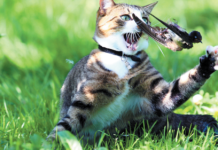Pop quiz (a tale of two feeding scenarios):
- You sometimes have to be away from home more hours than usual — perhaps even overnight — and don’t want your cat to go hungry in your absence. True or false: In those situations it’s a good idea to put your pet’s food in an automatic feeder that’s set to dispense the meal at a certain time so she won’t go hungry in your absence.
- Your cat’s idea of when it’s time for breakfast is very different from yours. Although you love her, you’re sick of being woken at dawn and having your pet bop you in the head to put out her food. True or false: In that scenario, it makes sense to use an automatic feeder on a regular basis. That way, your cat can get her food when she wants it, and you can sleep until it’s time for you to get up.
Answers: 1. False. 2. True.
The reason it’s a bad idea to use an automatic feeder in your extended absence is that your cat should not be left alone for an amount of time approaching — or exceeding — 24 hours. Even though cats often seem to take our human presence very casually, they feel more secure when we’re there — calmer and more confident. They also need someone around in case they get locked in the basement while exploring or become ill. Sickness does not arrive on a convenient schedule.
Furthermore, a timed feeder can malfunction. Or the batteries can die. Or there can be some other mishap. “Once I came home to find my cats had tipped over the water bowl and had no water all day,” Dr. Linder says. “I felt so bad. Thank goodness it wasn’t longer than a work day!”
Thus, if you’re going to be away from, say, 7 in the morning until midnight — or longer — you should either have a neighbor or friend come in to feed your cat in your absence or hire someone to do so. Whoever visits your pet should not only put out the food and check to make sure she is okay, they should also hang around a little while to see if the cat wants some petting or brushing or play or lap time. It’s the humane way to go.
The cat who won’t let you sleep — that’s a whole other story. Dogs — they beg and plead and then give up. But a determined cat insists. And “if you cave,” says Tufts veterinary nutritionist Deborah Linder, DVM, “that proves a point to them, which is that if they try hard enough, they can train you. I’ve definitely seen that with clients quite a number of times.”
Those are just the cases in which regularly using an automatic food dispenser set on a timer can come in handy. It teaches a cat that haranguing you will not cause food to appear.
Timed feeders are good for another purpose, too, Dr. Linder points out. They make sure you don’t overfeed. The amount of food you weigh for the feeder is the amount the cat gets. There’s no badgering you for seconds, which becomes particularly important for a cat who requires a weight management plan to slim down and be-
come healthier.
You’re still there, interacting with your cat, playing with her, cooing to her, grooming her, and reassuring her with your presence. You’re just no longer the abused waiter or waitress. The healthy bond with your pet stays intact and may even improve because you won’t become grumpy and resentful over a lack of sleep.




